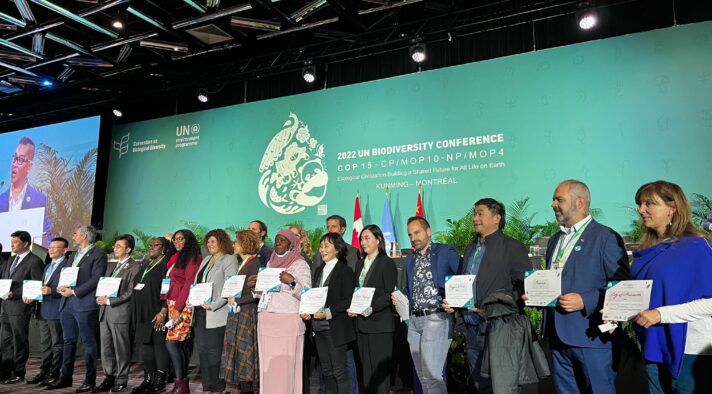- Regions towards a Resilient Future: delivering multi-level action on the ground’, a preparatory event towards COP27, took place yesterday in Rabat (Morocco), where around 40 regions from all over the world shared the actions that they are implementing at the subnational level to achieve the global objectives.
- The regions will bring a joint declaration to the convention in Egypt, the ‘Declaration of Rabat-Salé-Kénitra of the Regional Governments towards COP27’, which is in the contribution phase. In it, they commit to “accelerating actions and localizing global objectives through innovative solutions”.
- The event was held within the framework of the 20th anniversary of the Regions4 network and its General Assembly, a moment to share the good practices and success stories of the regions and their network in these 20 years, as well as to mark the lines of future work.
Press Release – Rabat, 17t June 2022
Yesterday afternoon, ‘Regions towards a Resilient Future: delivering multi-level action on the ground’ was held, a preparatory event for COP27 of the international network of regional governments Regions4. Through it, about 40 attending regions were able to share the strategies and measures that they are implementing at the subnational level, with the aim of jointly meeting the global objectives and ensuring that their voice is represented in the global forums. The event is part of a meeting held on the 15th and 16th in Rabat (Morocco), coinciding with the 20th anniversary of the network and its General Assembly.
Regions4 is composed of 42 regions from 21 countries on 4 continents and is currently chaired by the Basque Country. In these 20 years, it has been their voice in UN negotiations, the initiatives of the European Union, and the global discussions regarding sustainability and the environment. To celebrate this trajectory and address the importance of their leadership on the path towards the planet’s resilience, the main political leaders at the regional level have shared success stories, good practices, and future prospects in Rabat.
Member regions and associations from all over the world have attended, in addition to some invitees: Rabat-Salé-Kénitra, Association Regions Maroc and Fez-Mekinez, Morocco; Communauté des Communes de Plateau, Benin; Hauts Bassins and Centre-Nord, Burkina Faso; Louga, Gossas and Saint-Louis, Senegal; Basque Country, Navarra, La Rioja and Catalonia, Spain; Bretagne, La Réunion and Auvergne-Rhône-Alpes, France; Flanders and Brussels, Belgium; Scotland, UK; Lombardy, Italy; Åland Islands, Finland; Guanajuato, Jalisco and Yucatan, Mexico; Rio de Janeiro, Santos and Sao Paulo, Brazil; Québec, Canada; CONGOPE and provinces of Ecuador; Maharashtra, India; South Australia; North Carolina, USA; Nouakchott, Mauritania; Segou, Mali; and Cross River State, Nigeria. In total, more than a hundred political representatives and technical staff from all around the world have attended both in-person and online.

Transformative change is needed to achieve the Sustainable Development Goals, including a system-wide shake-up to put the value of nature at the center of UN agendas.Declaration of Rabat-Salé-Kénitra of the Regional Governments towards COP27
At the event, the draft of the ‘Declaration of Rabat-Salé-Kénitra of the Regional Governments towards COP27’ was presented, a joint testimony that they will take to the convention in Egypt with the aim of claiming their presence in global decision-making.
The regions state that “transformative change is needed to achieve the Sustainable Development Goals, including a system-wide shake-up to put the value of nature at the center of UN agendas.” They are also aware of their responsibility: “We, subnational governments, recognize our key role in responding to the climate crisis and biodiversity loss, and the need for urgent action to mitigate and adapt to climate change, towards a more sustainable, equitable and healthy world for all”, the declaration claims.
For this reason, the regions at the COP27 in Egypt will advocate for “achieve net-zero emissions, lead the way towards adaptation and resilience (including subnational governments in decision-making, implementation and monitoring), contribute to the Global Goal of Adaptation and the Global Stock Take, mobilize financing for adaptation and resilience and connect the agendas towards resilience”. Finally, they offer their experience, knowledge and skills to implement an integrated approach to climate action.
The declaration is a draft open to contributions and may be signed until October 30 by the regions.
‘Delivering multi-level action on the ground’
Mrs. Arantxa Tapia, Minister of Economic Development, Sustainability and the Environment of the Basque Government and President of Regions4, opened the session by recalling: “We celebrate 20 years of experience of Regions4, an alliance that brings together nearly 200 regions to work collectively in the search for solutions to the great global challenges: climate crisis, loss of biodiversity and sustainability. Our political influence, cooperation and action in our territories are the basis for leading a truly transformative global governance, with solidarity and sustainable development as fundamental pillars”.

Our political influence, cooperation and action in our territories are the basis for leading a truly transformative global governance, with solidarity and sustainable development as fundamental pillarsMrs. Arantxa Tapia, Minister of Economic Development, Sustainability and the Environment of the Basque Government and President of Regions4
Afterwards, the foundations on which the different existing networks operate were established and the opportunities they offer were addressed. Mrs. Sophie De Coninck, manager of the Local Climate Adaptive Living Facility (LoCAL) – United Nations Capital Development Fund (UNCDF), stressed that “it is very important that regional governments are represented at COP27”. It was followed by Mrs. Kata Tutto, president of the Green Deal Going Local working group – ENVE commission of the European Committee of Regions, highlighting the “construction of global communities with local ambitions that seek to make cities take them into account”, with tools such as the Covenant of Mayors.
Mrs. Natalia Uribe, Secretary General of Regions4, moderated the first of the panels, where three regional governments shared the actions they are implementing to accelerate the path to resilience. The first of them, La Rioja, led by the Minister for Sustainability and Ecological Transition, Mr. Alejandro Dorado; the second, by the Vice-President of the Rabat Salé Kenitra region, Mr. Mustapha Jawadi; and the third, Jalisco, with Mr. Sergio Graf, Secretary of the Environment and Territorial Development. They all agreed that their regions are developing plans and strategies that promote renewable energies, that contemplate adaptation to climate change, circular economy, decarbonization, that avoid the loss of biodiversity… and seek turning them into transversal tools of its regional policies. Problems derived from an already tangible change were also shared; in the case of Morocco, the scarcity of water, as it is one of the countries with the least drinking water per inhabitant.
We need to measure the loss and damage caused by climate change, something that is already being experienced, especially in vulnerable regions, its importance must be underlined in the international community.
Mrs. Màiri McAllan, Minister for the Environment and Land Reform of the Scottish Government

The second panel, on recommendations to accelerate the implementation of resilient actions, was moderated by the General Director of Ihobe-Basque Environment Agency of the Basque Government, Mr. Alexander Boto. It included presentations by the Secretary for Climate Action of Catalonia, Mrs. Anna Barnadas; Mr. Badara Samb, Vice President of the Louga Region, Senegal; and Mrs. Màiri McAllan, Minister for the Environment and Land Reform of the Scottish Government. Barnadas listed some priorities for sustainable development, such as the protection of a diverse landscape and the distribution of the population (almost all of it is concentrated in urban areas, which constitute only 6% of the Catalan territory). Samb addressed how in his region it is essential to have an agricultural strategy and to propose joint projects and solutions that cover “common needs that do not leave the problem of climate change to others”. Lastly, McAllan highlighted the need to measure the loss and damage caused by climate change, something that is already being experienced, especially in vulnerable regions, and stressed that “its importance must be underlined in the international community”.
A High-Level political meeting
The Rabat event began on Wednesday afternoon, with a High-Level political meeting where impressions and doubts were shared through a debate. In it, the achievements obtained throughout these 20 years were valued; among them, bringing together a community of nearly 200 regional governments to work collectively, bringing their voice to the main global forums on sustainability and the environment and achieving recognition for their role in the implementation of policies and innovative solutions by the resilience of the planet.
However, the regions continue to look to the future, a more resilient future where they are the ones that lead the fight against climate change. For this reason, questions also arose, such as whether common objectives or the same roadmap should be agreed, or assess the co-creation of projects by geographical areas to generate knowledge with the option to be replicated in other areas.
The President of Regions4, Mrs. Tapia, concluded in this session that “Regions4 is a community that makes us stronger, that gives us value. It is a symbol of prestige. Let us use it with intelligence, to grow more; to go further”.
General Assembly
The annual General Assembly took place yesterday morning. President Tapia opened the session highlighting “the key role” that regional governments have achieved “in the implementation of innovative policies and solutions for the resilience of the planet”.
According to Mrs. Tapia, this has been achieved thanks to four axes: “On the one hand, advocacy, presence and active participation in the main United Nations forums; on the other, cooperation, since Regions4 interacts with more than 200 regional governments around the world, representing millions of people, institutions, social agents and companies; thirdly, the impact, both qualitative and quantitative, of the thousands of actions carried out to adapt our territories and ecosystems; and, finally, the perspective of co-responsibility, a multilateral collective cooperation that responds to the most urgent global crises”.
A year of highlights
This 2022 is a year of highlights: 50 years have passed since the United Nations Conference on the Human Environment held in Stockholm in 1972, in which the United Nations Environment Program (UNEP) was created. It is also the 30th anniversary of the United Nations Conference on Environment and Development held in Rio de Janeiro in 1992, which was the first step towards the United Nations Framework Convention on Climate Change (UNFCCC). In turn, Regions4 Sustainable Development turns 20.

For further information, please contact:
Alba Díaz de Sarralde | Media Advisor | Gabineteseis
adiazdesarralde@gabineteseis.es / M. +34 659 59 35 62
Photo Gallery: https://flic.kr/s/aHBqjzTJHv



